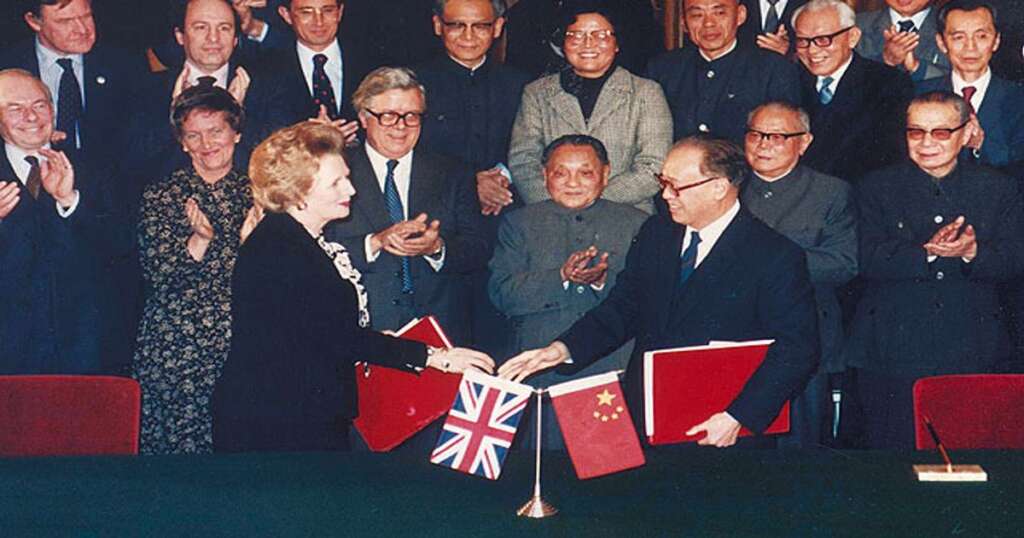The world is told a simplistic black and white tale about Hong Kong’s troubles in 2019, with heroic “pro-democracy” activists crushed by Beijing. What really happened was very different and far more complex, says a detailed new book by top Hong Kong academic Daniel F. Vukovich.
A DAILY HAIL of petrol bombs, scores of destroyed metro stations, and an unwanted new image in the world’s newspapers—what the people of Hong Kong suffered in 2019 will not forgotten by any one who lives in or cares for that community.
Yet that recent period of violent, arson-filled street battles in Hong Kong should not have been a surprise, as it was the inevitable result of an overdue transition to a post-British colonial reality, says a new study by a top intellectual.

The community on the coast of Southern China had originally been set to move co-operatively from British to Chinese leadership in 1997—but that hope was sabotaged by last-minute unilateral changes by the British, says Daniel Vukovich, an academic at the University of Hong Kong. As a result, festering tensions were left, and they eventually exploded into violence in 2019—with at least a little help from foreign forces.

The important underlying factors behind the violent unrest in Hong Kong remain little understood in the wider world, Vukovich (pictured) correctly says. The political journey that Hong Kong has taken in the past few years has been simplified and misunderstood—and still is, he warns.
FILLS THE KNOWLEDGE GAP
Vukovich, a scholar known for his political analysis, identifies the knowledge gap in this issue and fills it with great care in a superb new book that goes out of its way to give an honest and even-handed analysis of Hong Kong’s political storm in 2019—and its move towards recovery in 2020.

The book is called After Autonomy: A Post-Mortem for Hong Kong’s First Handover, 1997-2019 (Palgrave Macmillan). That’s a title which may make some readers think it is part of the “Hong Kong is dead” literature churned out by so much of the international media in endless gloomy feature articles.
Yet that’s not Vukovich’s message at all. The book is an obituary only for a Hong Kong weighed down by the vestiges of colonial influence, and he argues that the famously adaptable community is likely to have a positive future as it finds its footing in a new role as an integrated part of the country in which it is embedded.

Vukovich sees a positive future for Hong Kong as it finds its role in fast-growing China. Image: Jimmy Chan/ Pexels.
ANTI-CHINA MOVEMENT
To examine the stages of the difficult recent journey the community has taken, he intelligently examines the strands of tension that erupted into the violent protests of 2019, and discusses how Hong Kong will grow in the future.
Readers will be pleased to note that the author is a careful researcher with an eye for facts, and gives a far more accurate description of events than we read elsewhere.

The deal: Hong Kong was never promised FULL autonomy in the joint declaration of 1984. The territory was to return to Chinese administration with “A HIGH DEGREE of autonomy” except in matters such as national security. It transpired Hong Kong received far more autonomy after 1997 than any side expected. The Chinese leaders also made a commitment to retain the economic system (free market capitalism) and the legal system (common law) for at least 50 years. This was often unhelpfully misrepresented by journalists as a promise to make “no changes” until 2047.
FLASHPOINT
The press, for example, continually describes the civil unrest of 2019 as “pro-democracy protests”. Vukovich correctly points out that it was much more complex. The actual flashpoint was a call for the removal of a bill to amend an extradition law in Hong Kong, and triggered a movement that was fundamentally anti-China and anti-government.
While there were liberal uses of words such as “suffrage” and “democracy”, he says, these were “crossed with a great deal of anti-communist and xenophobic rhetoric about invasion, take-over, encroachment and so on”.

The main slogan was “Liberate Hong Kong in the revolution of our time”, lifted from pro-independence campaigners, and the people calling for the “five demands” were asking for the impossible—and some very likely knew that was so, Vukovich says. He points out that “it is not even in the power of the C.E. [Chief Executive] to change the Basic Law and any of the fundamental governance structures.”

The main slogan of the protests, “Liberate Hong Kong in the revolution of our time” was coined by Edward Leung Tin-kei (梁天琦), a pro-independence campaigner, jailed for violence. His group, known as the Indigenous, portrayed Hong Kongers as different from people on the other side of the border, although both are biologically from the same DNA haplotype and speak the same language.
UNREAL NARRATIVE
The protesters’ lack of realism was somehow allowed (by its leaders and the press) to power the movement, even while wiser voices tried to point this out to them. “But they would nonetheless demand the impossible and stick to their ideals/ demands, perhaps in the Utopian hope that someday it might become true, that the mainland system would wither away or implode (or fall by mutual destruction aka burnism).”
Vukovich acknowledges the presence of outside influences, saying that “we must finally acknowledge the decisive, even fatal dark side of the 2019 protests, namely the direct and ‘successful’ solicitation of, or indeed collusion with the United States government and other powers in an attempt to ‘save’ or ‘protect’ Hong Kong by intervening in its own and China’s affairs.”

But he says that even without the “color revolution” elements, the protests would still have happened, thanks to the “deep passions and discontent of the protesters” which were decades in the making.
CO-OPTING THE MEDIA
The book has many useful insights, but one of the most powerful is his analysis of the way the protest movement successfully co-opted the media as a key part of its operation. The media backed the protesters even after they moved to a nihilistic strategy to destroy their community’s own economy, and some protesters continued to “act violently or nastily towards other citizens”.

There was an “attempt to mediatize the ‘democracy’ movement within Hong Kong, deploying the ‘fifth estate’ in an effort to secure its autonomy or freedom—from the specific bill but moreover from the mainland in general and the process of Hong Kong’s (inevitable) integration,” he writes. There were numerous occasions at protest incidents when the media far outnumbered the actual protesters and the police officers, the scholar notes.
FOREIGN INTERVENTION ALWAYS A BAD MOVE
While the protesters were successful in partnering with the media and the United States government to support their operations, this was not a wise move in the long run, as “all such forceful uninvited interventions by one (usually western) country into another have historically amounted to a political if not also economic imperialism or quasi-imperialism. And moreover a disaster for the majority of the ‘native’ people involved, regardless of where they might fall on the political spectrum.”

A better knowledge of history would have helped all participants, he says. “When other powers, be they states or foreign NGOs—intervene and attempt to change other countries, or regions, or peoples, only harm is done. (This applies as well to China invading Vietnam in 1979 as it does to American imperialism world-wide, not to mention the modern French and British empires themselves.)”
While in the past, it would have been simple common sense to realize that calling for military intervention by hostile forces could have only a negative effect, today such logical thinking is over-ridden by a “powerful neo-liberalism and ‘human rights imperialism’ that eventually triumphed after the Cold War,” Vukovich says.
BEIJING’S NON-INVOLVEMENT
The writer is also not fooled by the protest movement’s claims that “a million people” or “two million people” marched, even if the press presented the numbers uncritically. Studies by crowd-analysis specialists gave much lower numbers. Hong Kong people were far from united in their attitudes, an important point that is not made often enough.

Vukovich also does a great service for the Hong Kong community by pointing out how the protests really came to end—very differently from the “Beijing crushed the protests” narrative that has become common in the media. (The UK mainstream press recently reported that the Chinese guest at King Charles coronation was the Beijing man who had crushed the Hong Kong rebellion, causing 15 deaths, a version of events that has no relationship with reality.)
The real story is that the mainland chose not to intervene and allowed Hong Kong’s own local authorities to restore order (which they did in November of 2019). This was despite the fact the People’s Liberation Army was literally right there on the spot – the army HQ is neighbor to the Hong Kong government building around which the vast majority of protests were centered. China did not introduce the city’s long-delayed security law until the middle of 2020, half a year later.

Videos showing Chinese PLA tanks and troops entering Hong Kong to attack the protesters (screencap above) were circulated widely from July 2019 onwards, but none were accurate. Beijing showed an unexpected level of patience.
How did the Chinese leadership remain so patient? They had confidence that the rest of Hong Kong, the authorities and the people opposed to violent protests, would succeed in calming things down.
“What this means is that ‘Beijing’ did not think Hong Kong was going to fall from petrol bombs or demonstrations… of course they were fully aware of the lobbying efforts from Hong Kong to get the US involved. But they did not seem to have the same fear of imperialism or color revolution that others did (or that others greatly desired),” Vukovich says.
SYMPATHY FOR IDENTITY ISSUES
Vukovich remains sympathetic to the Hong Kong young people who were involved in the protests. The British took the “legally British” identity away from them in 1997, but left so much hostility to China in place (“an intellectual political culture that genuinely fears and loathes the mainland as a political if not total entity”), that many people in the community could not possibly see themselves as belonging to the “actually existing” nation and state of China (the P.R.C.).

So they had no national identity to take up, but instead localist, nativist, or Western-idealizing ones. Eventually, most people found their own equilibrium, but some ramped up their hostility and turned to violent attacks on mainland people—including the writer of the “Free Hong Kong in the Revolution of our Time” slogan, who ended up in jail long before 2019. “Not all forms of ‘identity politics’ are worth dignifying, and in some cases they are better described as racism or xenophobia,” Vukovich says.
TOLERANT, MAINLAND-INCLUSIVE EDUCATION
He also sees education as a problem. The local system is strong in some areas but very weak in others. “Surely morality (or ethics more specifically) should be part of any educational system. This is not what the SAR has, or rather it does not have enough of it and in a more open and tolerant, mainland-inclusive way,” he writes.

New Hong Kong leader John Lee Ka-chiu has made new relationships overseas, notably with West Asian (or middle eastern) nations. (Image: Hong Kong government.)
Vukovich also notes the contrast between the portrayal of Hong Kong’s new leader John Lee Ka-chiu and reality. His selection as leader “was predictably and immediately framed by the international media as ominous and a tightening of the screws,” Vukovich writes. But that was very different from his reputation in Hong Kong, where he was seen as “flexible and impartial” and been noted taking a calm, conciliatory attitude to hostile politicians.
Ultimately, the writer says, “the era of Hong Kong’s faux autonomy and exceptionalism is now over. This marks an overdue codification of reality”. The community is not dead, but has been through a difficult process. “Hong Kong has not died but is struggling to be born, again, as a fully post-colonial SAR.”
After Autonomy: A Post-Mortem for Hong Kong’s First Handover, 1997-2019 is published by Palgrave Macmillan.
Click here to buy it from Amazon.
Fridayeveryday does not get commission from any purchases.
Image at the top by Jimmy Chan/ Pexels. Images of protests in article from Oscar Chan/ Pexels.
